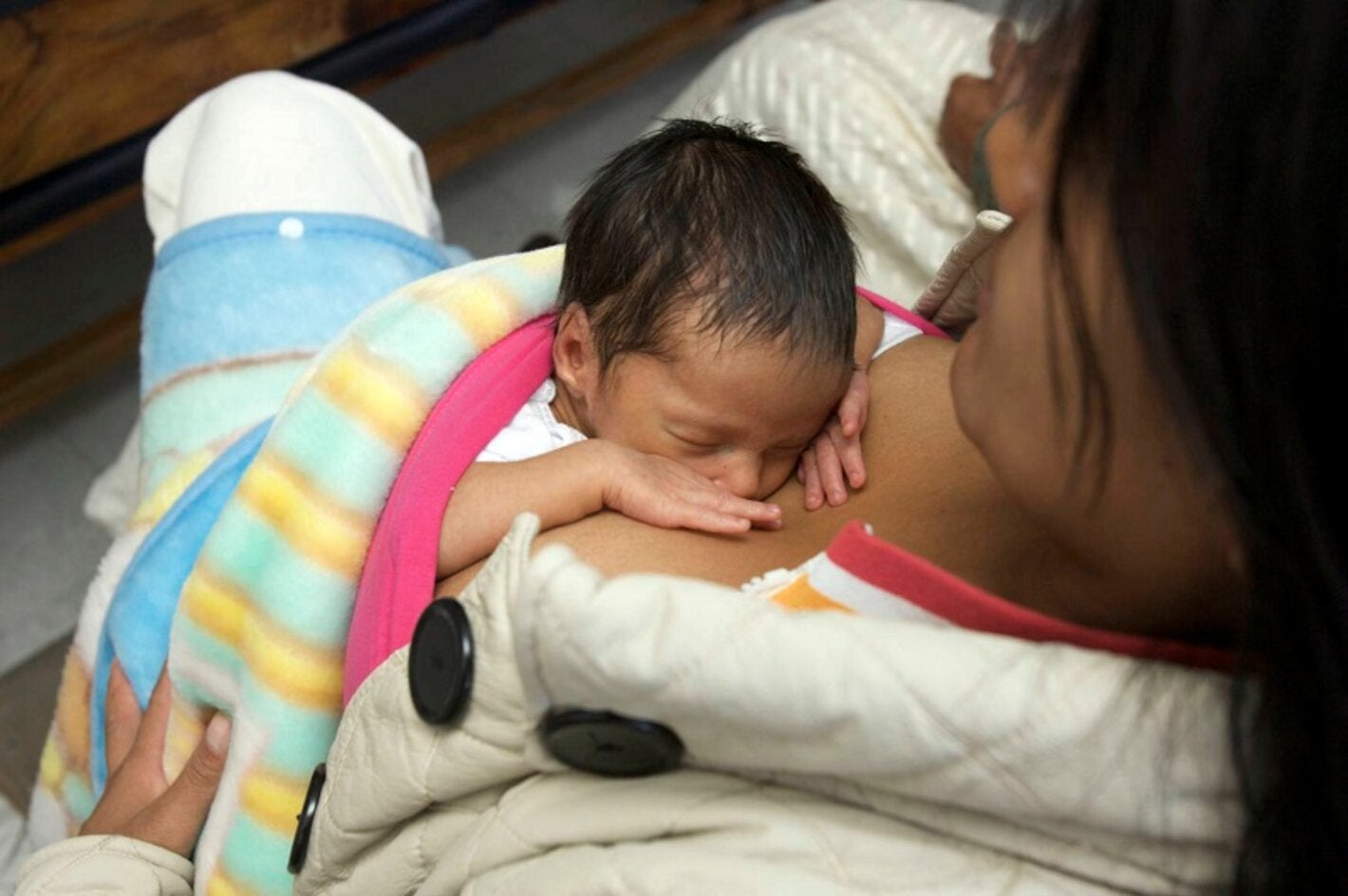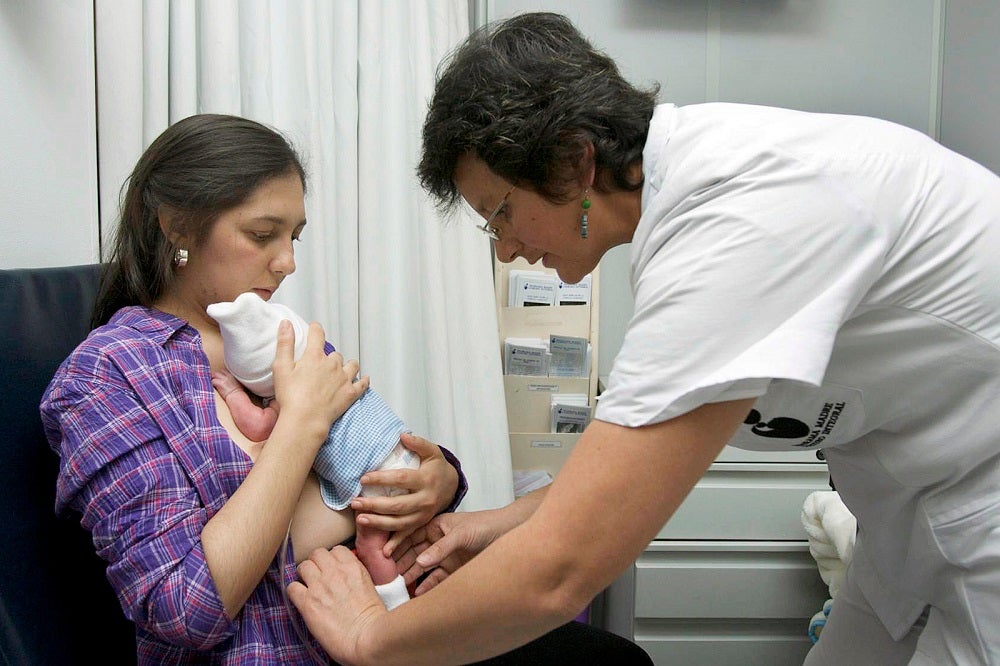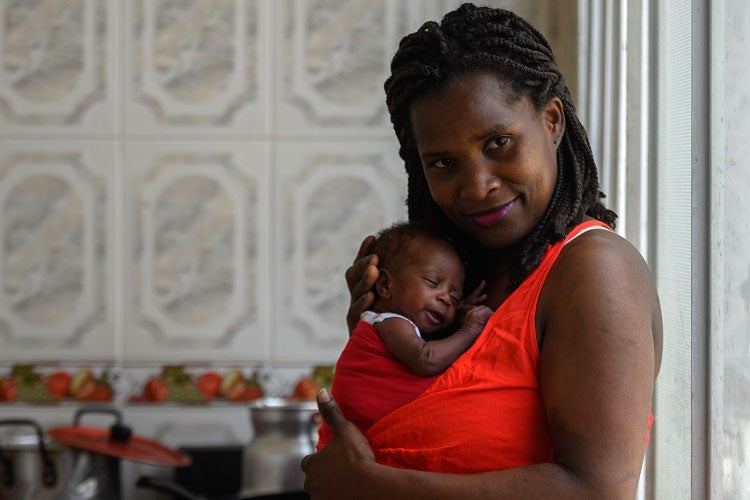
Montevideo. November 17, 2022. There were tense moments in the Neonatal Intensive Care Unit at the Port of Spain General Hospital in Trinidad and Tobago. "There was a very sick premature baby. It was a ventilated baby, less than 800 grams," says neonatologist Marlon Timothy, chairman of the National Neonatology Committee of Trinidad and Tobago.
"We were struggling to stabilize him. Since it was Mother's Day, and we have been encouraging Kangaroo Care in our country for some time, we encouraged the mother to hold him skin-to-skin. The baby reduced his oxygen needs by 50% when he was allowed to be skin-to-skin with his mother for one hour. The joy that all of us as staff and the mother experienced that day will remain etched in our memories."
As every November 17, since 2011, today marks World Prematurity Day. In the Americas region, around 1.2 million births occur prematurely. Premature babies require specialized attention and specific care to enable them to survive, grow and develop healthily. Complications of prematurity are the leading cause of death in the neonatal period and even in the first five years. The burden of disease and disability associated with complications of prematurity is estimated at a loss of 5 million disability-adjusted life years and premature death (DALYS).
This year, the theme of World Prematurity Day focuses on the promotion of skin-to-skin contact, a practice that the Pan American Health Organization (PAHO) and the World Health Organization (WHO) have been promoting for the best development and to ensure a healthy and loving experience for both premature babies and their families.
An evidence-based clinical practice guideline for the follow-up of newborns at risk, developed by the Latin American Center for Perinatology - Women's Health and Reproductive Health (CLAP/WR) recommends that parents or caregivers of newborns weighing less than 2,500 g should enter a kangaroo care program or be trained in the "skin-to-skin" technique, in order to increase weight gain, promote breastfeeding, and decrease the risk of death or serious infection or sepsis.
We spoke with neonatologist Marlon Timothy about skin-to-skin contact and the impact it has on premature babies and their families.
Timothy recalled that Kangaroo Care is a simple practice that is applied around the world in order to "help preterm and small babies stay warm, build maternal/paternal bonding, increase breast milk production, improve the well-being of the baby and boost maternal/paternal confidence."
In Trinidad and Tobago, Kangaroo Care was officially launched in 2019 by Minister of Health, Terrence Deyalsingh, at the Neonatal Intensive Care Unit of the Port of Spain General Hospital. However, this practice has been in existence since 1970, having had its beginnings in Colombia and then expanding worldwide.
According to the chairman of the National Neonatal Committee of Trinidad and Tobago, “for the babies, the benefits are tremendous and can be practiced even if the baby is in the Neonatal Intensive Care Unit on a monitor, with feeding tubes and intravenous fluid lines and even while on a ventilator. Kangaroo Care can stabilize a baby’s heart rate, improving their breathing pattern, making breathing more regular, improve oxygen saturation levels, allows them to gain sleep time, experience more rapid weight gain, decrease crying, have more successful breastfeeding episodes and result in an earlier hospital discharge”.
“As we celebrate World Prematurity Day in Trinidad and Tobago, we encourage all parents with babies presently in the Neonatal Units and even after discharge to promote and perform Kangaroo Care as the benefits to both the parents and the babies are priceless", he concluded.
Challenges to optimal skin-to-skin contact development
As in other areas of health, the Covid 19 pandemic also had a strong impact on the provision of newborn care services. A survey developed by WHO to determine the impact of the Covid 19 pandemic on the continuity of essential health services showed that more than one-third of countries reported interruptions in antenatal and postnatal care services, as well as services for newborns. The third round of the same survey, published in early 2022, shows that almost all countries in the Americas region continue to report interruptions in essential health services.
On how the practice of skin-to-skin contact in newborn babies was affected, Marlon Timothy also expressed. “During the Covid 19 Pandemic, visiting hours were severely reduced and this affected the ability to perform skin to skin care. Parents were equally afraid that they could infect their babies with Covid 19 and most opted not to hold their babies for long periods while warded”. Timothy highlighted the need to visualize the relevance of the immediate bond that is generated between baby and parent through Kangaroo Care. "This increases the confidence of mothers and fathers which is essential in the care of their premature or small baby".
In addition, the specialist indicated that in order for the practice to develop optimally, it is necessary to generate the right conditions. “Often there are many admissions to a room and we are unable to allow many parents into the space as the equipment and the space needed for the kangaroo care chairs is very limited. Parents also have little privacy with so many babies admitted to the rooms and feel discouraged to do skin-to-skin”. On this, Timothy stated that “In the future, we hope to have step-down units created where the primary mode of care will be skin-to-skin on these units”.
The specialist also said that it is important to work with healthcare teams and decision-makers so that they can appreciate the enormous benefits of skin-to-skin contact.
On the other hand, the regional advisor on Neonatal Health of CLAP/WR, Pablo Durán, said that the commitment of the States to these issues is urgent and recalled that it is still necessary to strengthen actions in order to achieve the goals set in the Sustainable Development Goals (SDGs).
Durán recalled that the Plan of Action for Women's, Children's and Adolescents' Health 2018-2030, approved by the Member States, promotes strategies and interventions aimed at helping newborns to survive, putting an end to preventable deaths, and to thrive, ensuring their physical and mental health and well-being. To this end, health care systems and the enabling environment for maternal and newborn care must be transformed to ensure that women and newborns receive respectful, quality care when and where it is needed.
Preterm and sick newborns and their families have specific rights and needs. Involving families in the care process, as well as obtaining support in the care process, is essential. Providing essential care for small and sick newborns requires specific policies and plans both during hospitalization and after discharge.
"This is where we are and will continue to work," Durán said. "Designing and implementing specific plans for the provision of comprehensive care for preterm newborns, with a focus on family-centered care, is essential to move toward the outcomes we hope to achieve. There is evidence showing the benefits of skin-to-skin contact and it is our duty to disseminate that evidence and work to lay the groundwork for the necessary transformations, in pursuit of the rights of babies and their families."





